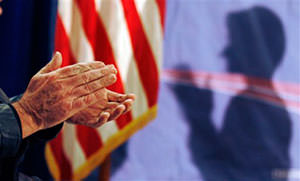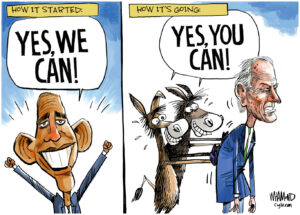There’s Hope for Republicans Yet
GOP candidates are embracing populism, but as the presidential election is now shaping up, voters will not be given a choice to rebuke Wall Street by either major party.
There is a full-blown debate going on in, of all places, the Republican Party about the failings of the governing, corporate-sponsored kleptocracy. Not so on the Democratic side. Spared a primary battle, the incumbent president need not defend his economic record, which is basically a redo of the save-Wall-Street-first stance initiated by his Republican predecessor.
That bipartisan establishment consensus, in which the enormous power of the Treasury and the Federal Reserve was harnessed to bail out the financial industry swindlers while ignoring the plight of their victims, has been challenged only on the Republican side, where the libertarian Ron Paul has tapped into the enormous populist rage among voters.
There is no comparable dissent among leading Democrats, who have been loath to take on Barack Obama’s embrace of crony capitalism — that fatal melding of Wall Street wealth with Washington political power — the way Paul and even Newt Gingrich have powerfully challenged Mitt Romney, the GOP’s Obama doppelgänger.
Yes, doppelgänger, and please don’t try to scare me with those hoary tales of how Romney is the second coming of the far right on social issues, when his entire tenure as Massachusetts governor proved quite the opposite. The issue in this campaign is the economy, and on that, by the time of the general election, there will be no serious substantive difference between the two major parties’ candidates. Both will squarely be on the side of the financiers who created this crisis.
The attacks on Romney’s association with the rapacious Bain Capital could apply with equal force to the Clinton administration veterans whom Obama has entrusted with managing the nation’s economy. The list begins with Lawrence Summers, who pocketed more than $8 million in Wall Street loot during the period when he was a top economic adviser to the Obama 2008 presidential campaign. Summers received $5.2 million from the D.E. Shaw private equity fund, which was up to the same sort of shenanigans as Romney’s Bain Capital.
Imagine the outrage among Democrats if a President Romney were to rely on three successive chiefs of staff with résumés as steeped in banking greed as those Obama has appointed. The first to guard the gate to the president was Rahm Emanuel, whose political career was generously backed by Magnetar Capital, an Illinois hedge fund that was a major purveyor of subprime mortgage-backed securities. Then came JPMorgan Chase’s William Daley, paid $5 million a year as the representative of that company in Washington, working to soften Obama’s already tepid efforts at reregulating the banks. And now, Jacob Lew, another Clinton-era retread who made himself wealthy between Democratic administrations by being COO of Citigroup Alternative Investments, specializing in betting that people’s mortgages, which other branches of Citigroup sold, would go belly up.
What has changed in American politics is that the growing army of disenfranchised stakeholders now fit as comfortably within what has been thought of as the plutocratic Republican Party as within its faux-populist rival. In an attempt to exploit the palpable populist anger in the Republican base, Romney’s opponents, as The Wall Street Journal reported, opened a “Pandora’s box of bitter attacks” claiming “in his business career he was a corporate predator, a heartless shredder of companies and jobs and the personification of all that is wrong with capitalism. …”
It is a line of attack that has worked because, as the Journal’s Gerald F. Seib points out, “Today’s Republican Party has become steadily more blue-collar, more populist and more influenced by voters who act as much like independents as Republicans. All of that makes the idea of attacks on capitalist behavior arising from the traditional party of capitalists a little less bizarre.”
The stats to back up that assertion are compelling; according to exit polls, 75 percent of Republican primary voters in New Hampshire had family incomes of below $100,000, and almost half did not have a college degree. It was from their ranks and among the nearly half of voters who identified as independents that Paul and third-place finisher Jon Huntsman pulled much of their support.
National polls support the notion of a more populist Republican base, and as the combined results of WSJ/NBC News polls over the last year show, blue-collar voters were slightly more likely to identify as Republicans than Democrats. Most startling was the finding from those same national polls when respondents were asked which party was responsible for the economic crisis: “Republicans were precisely as likely as Democrats to blame ‘Wall Street bankers.’ “
But as the presidential election is now shaping up, voters will not be given a choice to rebuke Wall Street by either major party. Expect razor-thin differences between Romney and Obama on the key issues at the heart of our economic crisis — the ravages of predatory multinational corporate capitalism that turns the nation state into a vehicle for ill-gotten gain, mocking both Adam Smith’s claims for the invisible hand in a truly free market and the assumptions of Jeffersonian democracy in which governance is in the hands of the common folk who are also stakeholders.
Your support is crucial…With an uncertain future and a new administration casting doubt on press freedoms, the danger is clear: The truth is at risk.
Now is the time to give. Your tax-deductible support allows us to dig deeper, delivering fearless investigative reporting and analysis that exposes what’s really happening — without compromise.
Stand with our courageous journalists. Donate today to protect a free press, uphold democracy and unearth untold stories.









You need to be a supporter to comment.
There are currently no responses to this article.
Be the first to respond.